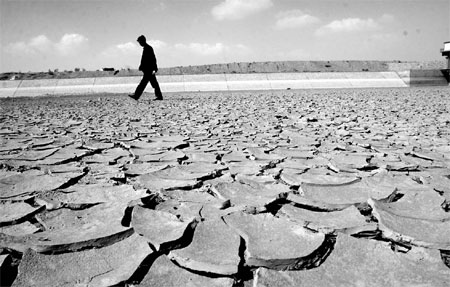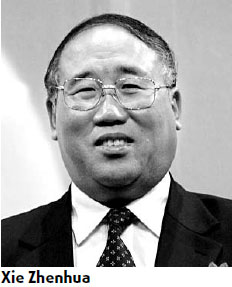


The two-week debate at UN climate change summit held December 1-12 in Poznan, Poland has borne fruit: 189 countries have agreed to start formal negotiations for a new treaty to fight global warming.
In spite of the unfolding financial crisis and looming global economic recession, the international community has shown the commitment to reduce global warming, though gaps between the poor and rich nations still remain.
"The scope of environmental problems is also grave," says Chinese delegation head Xie Zhenhua. "Therefore we must turn the challenge into an opportunity."
Warned by Nobel Peace Prize winner Al Gore that time is running out for solutions, delegates set deadlines to complete a treaty by next December in Copenhagen. Without a new plan to stem heat-trapping emissions, more glaciers will melt, sea levels will rise, and droughts and floods will intensify, UN scientists warn.
UN secretary-general Ban Ki-moon says China has set a good example in dealing with climate change through its national climate change measures.
It is recognition earned by Xie Zhenhua, vice-minister of National Development and Reform Commission when he headed a Chinese delegation at the two-week United Nations Climate Change Conference in Poland this month.
During a meeting with Xie, Ban cited China as an example at the conference. He says that other countries should learn from China's example in fighting climate change and praised the Chinese delegation for its constructive role at this year's meeting.
Ban adds that the High-level Forum on Climate Change and Technology co-hosted by the Chinese government and the United Nations last month will contribute greatly to next year's UN Climate Change Conference to be held in Copenhagen, Denmark.

Xie Zhenhua says that China has always been dedicated to supporting international cooperation on climate change. He pointed out that in 2007 China had took measures such as saving energy, improving energy efficiency and developing renewable energy and this had helped to reduce emissions by the equivalent of 835 million tons of carbon dioxide a year.
Su Wei, director general of the Department of Climate Change of NDRC and the Deputy head of Chinese delegation in Poznan, says that the principle of "common but differentiated responsibility" and equity are the two fundamental principles guiding international cooperation on climate change.
Developing countries need carbon space for their industrialization and urbanization and developed countries should transfer environmentally friendly technologies to developing countries to help them to address climate change, Su says.
The talks overran the scheduled close by nine hours, as rich and poor nations wrangled over an "Adaptation Fund" worth as much as US$1 billion by 2012 for developing nations to adapt to climate change. The fund can conceivably start paying out next year.
Oxfam International, a global poverty fighting organization, welcomed the decision to allow developing countries direct access to the Adaptation Fund, one of the most intractable issues of this climate change conference.
Oxfam, however, denounced the stonewalling by rich countries of another decision that it says could have made a real difference to those suffering the impacts of the climate crisis.
"This was an important decision on the crucial issues of accountability, effectiveness and control over the money available to poor countries for urgent adaptation needs," says Stanley So, policy officer of Oxfam Hong Kong, and a member of Oxfam delegation at Poznan.
"However, the elephant in the room is still where the money for adaptation is going to come from. We urgently needed a decision on increased future funding for adaptation, but we didn't get there."
The Adaptation Fund was established under the UN Framework Convention on Climate Change to support adaptation program in developing countries. The aim is to protect vulnerable communities from the impacts of climate change and support them to adapt.
It has taken over a decade to put the fund in place. Moving quickly to get funding for needs like agricultural adaptation, disaster risk reduction and community resilience is more urgent than ever, says Stanley.
"Rich governments finally woke up to the idea that vulnerable countries should have direct access to funding, instead of facing overly cumbersome procedures," says Stanley.
At least $50 billion a year is needed to help the poor face the impacts of a changing climate according to Oxfam's estimates, and far more if emissions are not cut fast and far enough. Norway and others have proposed market-linked mechanisms that they say would provide adequate funding.
Key to next year's agreement will be finding common ground between China and US, the two largest emitters, says former United States senator from Colorado Tim Wirth, who led US negotiations for the Kyoto Protocol. Binding targets, which were given only to industrialized countries in that 1997 agreement should be left out of the negotiations for a treaty in Copenhagen, he says.
"If you start from caps you'll be in a fight all the time," Wirth, president of the UN Foundation, said in an interview in Poznan. "You want to get people discussing what they can agree on, and you put the things you're going to fight about in the freezer for a while."
Signs of transition
Senator John Kerry of Massachusetts arrived at the United Nations conference reassuring delegates from around the world that the United States would take strong measures to combat climate change.
"President Obama will be like night and day compared to President Bush," he says at a news conference, adding, "Congress and the president-elect are committed to movement on mandatory goals as rapidly as possible."
Although the incoming Obama administration had no official representatives at the meeting, the conference center was crawling with American lawmakers, or at least their staffers, a sign of a transitional and potentially transformative moment in US climate politics.
Despite elation at the new US presence, there has been widespread concern among delegates that developed nations would be less willing to make the financial investments in climate change in a time of global recession.
Agencies contributed to the story
(China Daily 12/22/2008 page4)













